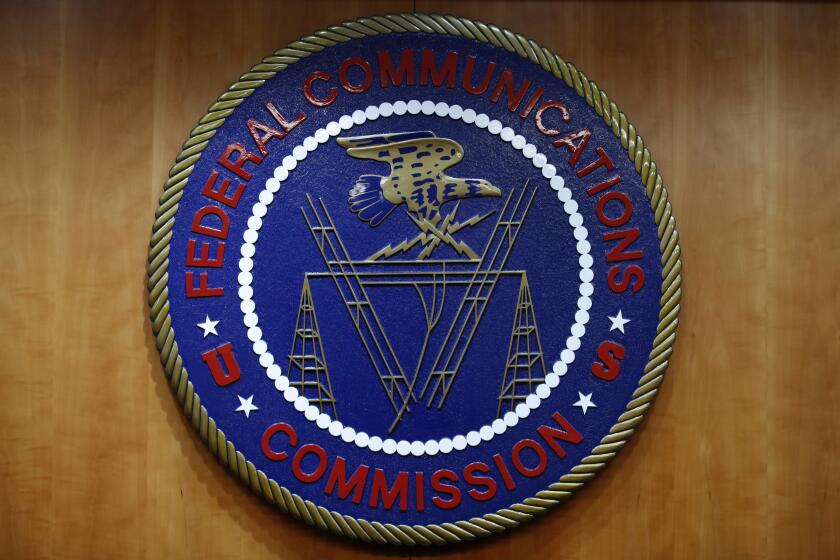Iowa’s campaign-free zone
WEST BRANCH, IOWA — There’s a Maytag repairman quality to Timothy Walch, a thoughtful and interesting scholar who has been waiting almost 20 years for a presidential candidate to stop by the well-tended brick building on Parkside Drive (just past Quizno’s sandwich shop, then take a hard left) to say hello and maybe talk a little politics.
They never come.
None of the 16 candidates in this year’s presidential race, nor any of their predecessors from at least five earlier Iowa caucuses. Oh, they might stop at the McDonald’s restaurant on the other side of Interstate 80, or maybe walk the streets of West Branch and shake hands with a few of the 2,200 residents.
But they whiz past the Herbert Hoover Presidential Library and Museum, as if the nation’s 31st president were waving to them from the parking lot and yelling, “Come on over! Let’s reminisce about the Great Depression -- and then you can have your picture taken with me!”
Walch, the library’s executive director, is far too diplomatic to come out and say it, but it’s plain as Iowa corn blight that Hoover, who was drummed out of office more than 75 years ago and died in 1964 at age 90, is still radioactive after all these years.
“Who knows why they don’t come, other than to say that perhaps they don’t think it’ll do them much good, or that it might even hurt them,” Walch said. “It’s not like Kennedy or Reagan, where they look to Velcro themselves to the president’s legacy. . . . The attention Hoover gets is never positive.”
Though Kennedy and Reagan represent the gold standard, former presidents sometimes spend decades shunned in the political netherworld before a measure of rehabilitation sets in. Harry Truman, for instance, was an object of national derision when he left office in 1953. Two decades later he began to embody the straight-talking, no-nonsense virtues that Americans adore in politicians, but mostly only after they’re dead.
Hoover, a Republican, still resides in that purgatory. Despite a remarkable career of business success and worldwide humanitarian efforts, the most memorable recollection from Hoover’s is the Great Depression.
And woe to the presidential aspirant who makes the turn onto Parkside Drive, because the first or second paragraph of the news story -- and the 30-second TV ad from a rival candidate -- would seize on the obvious. Grainy file footage of Hoovervilles, the pitiful communities of Depression-era homeless, would follow.
Walch is a patient man who understands the forces of history, the brutal nature of modern campaigns and how Republicans, especially, are sensitive to the perception of Hoover.
“Politics, particularly in this heated environment, is not subtle,” Walch said. “Many candidates feel they don’t have the time to nuance the message.”
Still, Walch cannot hide his impatience because Hoover, in many ways, is the prototype of today’s GOP presidential candidate. He made his mark in business before entering elective politics. He frowned upon government intervention. He was a can-do guy who didn’t like to mess with cumbersome bureaucracies. Sound familiar?
Candidates could not use the Hoover library as a venue for, say, a rally, Walch acknowledged. But they could come for a tour, to learn about the man who created the National Institutes of Health, saved millions of European lives in a post-World War I food drive and led relief efforts after the Mississippi River flood of 1927. It would just be lunch, not romance.
Last year, one of GOP candidate Mitt Romney’s sons came to the library for a tour. “I tried to convince him to get his dad to stop by,” Walch said. Walch even mentioned that as an undergraduate at Notre Dame University 40 years ago, he headed the campus effort to elect George Romney, Mitt’s father, president.
No dice. The former Massachusetts governor spent more time in Iowa than any other Republican candidate before Thursday’s caucuses, but his travels did not include the Hoover library.
Some will argue that more than a few presidents aren’t worth remembering. You don’t hear candidates in Ohio invoking the words of Warren Harding. Nor is there much clamor in strategically important New York for the wit and wisdom of Millard Fillmore.
There is, though, an effort to rethink the Hoover legacy, Walch said. That includes a new documentary being prepared for PBS. Others in Iowa are mounting their own campaign to fairly portray the life of the only Iowan sent to the White House.
Altering public perceptions will not be easy.
“Intellectually, most people acknowledge that Hoover was not responsible for the Depression, but they don’t look at it the same way emotionally,” he said.
“This is not an issue of fact, but feeling. We tend to honor those presidents we are emotionally attached to, not intellectually.”
And as for any candidate stopping by this campaign?
“Well, we’ll be here sitting around the cracker barrel,” Walch said, “waiting for them to show up.”
More to Read
Get the L.A. Times Politics newsletter
Deeply reported insights into legislation, politics and policy from Sacramento, Washington and beyond. In your inbox three times per week.
You may occasionally receive promotional content from the Los Angeles Times.






